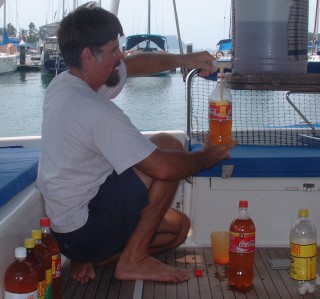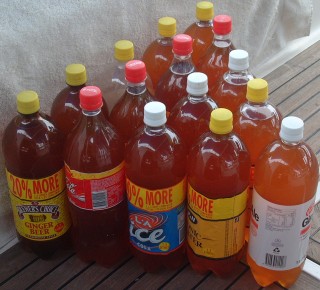
Bottling Bavarian Lager in One°15 Marina, Singapore.
Note the wet cooling-cloth around the carboy.
Bavarian Lager
We left Kalimantan (Indonesian Borneo) and our fabulous jungle river trip several days ago. Since then we've been sailing NW up the Java Sea towards Singapore. This morning, the wind went very light (as expected, so near the equator) so we've been motoring much of the day, charging batteries and making water. What an excellent time to brew up another batch of beer!
 Bottling Bavarian Lager in One°15 Marina, Singapore. Note the wet cooling-cloth around the carboy. |
Since most of my recent beers have been on the darker side, and since we're getting into a somewhat hotter and steamier climate, I decided to go for a lighter beer this time. Coopers has a line of beers they call their "International Series" (like their Australian Pale Ale) and for this batch I selected a Bavarian Lager, which I've never done before.
Wednesday, 18 October 2006 - Preparation:
This is becoming fairly routine now. I assembled my carboy, 2 big spoons,
tap, and water trap, put everything in the carboy with a few drops of brewers
detergent and some water and scrubbed everything. Rinsed everything
several times to get all the detergent off. Then I put everything back in
the carboy with some sodium-metabisulfite sterilizer and let them soak for a
couple hours before again rinsing everything thoroughly. My only real
change from before was to let everything soak longer (mainly because lunch and
siesta time came along).
Wednesday, 18 October 2006 - Coopers Bavarian Lager:
Coopers recommends their Brew Enhancer #1, a dextrose and maltodextrin adjunct sugar mix, for their
Bavarian Lager. I didn't have any of that so I used 1kg of Brew Enhancer #2, a dextrose,
malt, and maltodextrin mix, pouring it into a couple of liters of water that
I'd put in the bottom of the carboy. I'm not sure the additional malt is
really necessary for a Bavarian Lager and I might not have added it if I'd had a
choice, but I don't think it will hurt anything.
The sugar/water mix was stirred to remove most lumps. The Bavarian Lager
malt mix went in next, with the final bit at the bottom coaxed
out with a few tablespoons of hot water.
Tap water was then added while the mix was stirred. Daytime temperatures here have touched 90°F (32°C) so I decided to add 3.5 liters (~1 US gallon) of cold water from our fridge. This will help the initial wort temperature, but keeping everything in the optimum temperature range (70°-80°F or 21°-27°C) will be almost impossible. Even keeping the wort under the critical limit of 90°F (32°C) will be difficult. Water was added to make up 23 liters, the specific gravity was measured (1.040), the yeast was sprinkled on top, the carboy was sealed, and the water-trap was inserted. Initial wort temperature seems to be about 82°F (28°C).
|
Thursday, 19 October 2006 - Fermenting:
Fermentation started sometime in the night. Since we'd just come off
4 nights at sea (and a lovely dinner on
Estrela),
we crashed pretty early and didn't see fermentation start.
Interestingly, Cooper seems to use only Ale yeasts for their home-brew kits, even for their Lagers. This is probably because Ale yeasts are somewhat hardier and can accommodate a wider temperature range. Lager yeasts typically need to be kept much cooler, and consequently take longer to ferment.
To counter the heat I have covered the carboy in wet cloths. In fact, since we have lots of power, I'm using refrigerated water to wet the cloths, to improve the cooling. Somewhat to my surprise, this appears to have worked better than expected. While it's a lot of work, the rate of fermentation is actually lower (lasting longer and not reaching such a fever pitch, all of which is better) than my last 3 batches! Not since my first Bitter (probably our nicest batch of beer to date) has a fermentation gone so well.
 A nice harvest of pale Bavarian Lager |
Tuesday, 24 October 2006 - Bottling:
We've now arrived in Singapore and we're tied up at the One°15 Marina, looking
for tickets to fly back to the USA. Unfortunately, we've just found out
that my brew-meister brother, Tony,
has a rare and aggressive cancer, so we're heading back for a month or so.
Since we want to leave soon and the marina supplies us with more-or-less
unlimited water, this is an ideal time to put this batch to bed.
Preparation and cleaning of the bottles was fairly standard. I used 1.5 liter bottles so I could identify them from the Bitter that I'd bottled in 1.25 liter bottles. The bottles were rinsed (they were already pretty clean) and then a strong solution of sodium-metabisulfite was poured from one to the next. The bottles were allowed to sit for an hour or so before being thoroughly rinsed out. Unfortunately, while cleaning the fill-tube went as expected, my (relatively) new fill-valve crumbled, so I just used the carboy valve at the top of the fill-tube (see photo above).
The final specific gravity was again quite low, at 1.008. Given that my initial specific gravity was fairly high (1.040) I expect a net alcoholic content of about:
((1040-1008)/7.46) + .5 or about 4.8%, fairly close to perfect for most beers.
As has become standard, we sort of over-primed the bottles by about 17% to increase carbonation and improve the head. Bottling went reasonably well and we harvested 14.5 1.5 liter bottles, for a total of almost 22 liters! These were stored under the cabin sole in Amanda's stateroom to keep cool (as possible) and age while we were in the USA.
Brewing Pages:
Jon's Pages:
Top Level: Home | Destinations | Cruising Info | Underwater | Boat Guests | Ocelot | Sue | Jon | Amanda | Chris | Site Map | Make a Comment
|
If our information is useful, you can help by making a donation |
Copyright © 2000‑ Contact: Jon and Sue Hacking -- HackingFamily.com, svOcelot.com. All rights reserved.